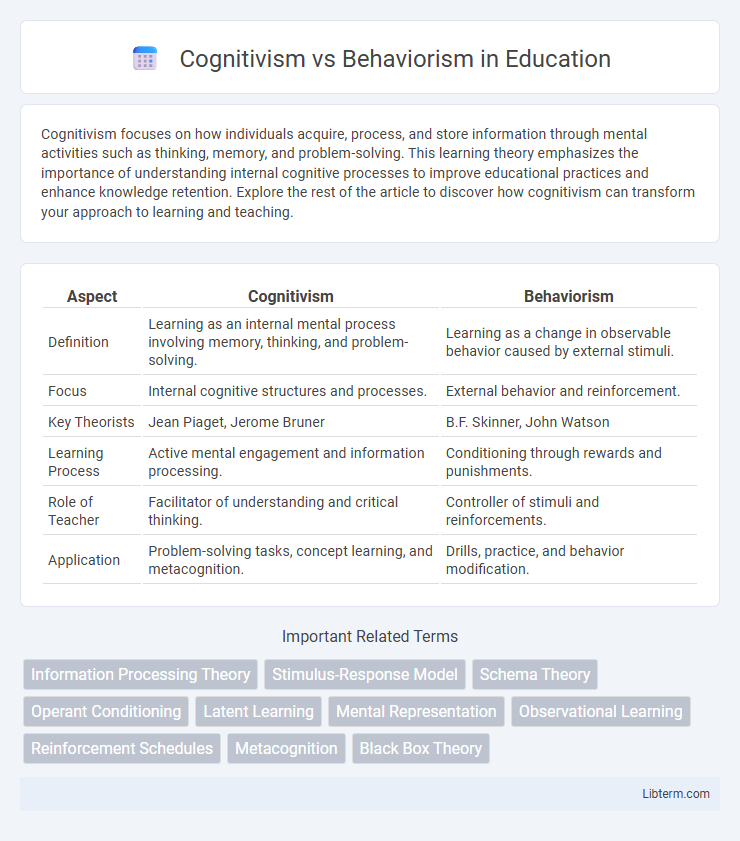Cognitivism focuses on how individuals acquire, process, and store information through mental activities such as thinking, memory, and problem-solving. This learning theory emphasizes the importance of understanding internal cognitive processes to improve educational practices and enhance knowledge retention. Explore the rest of the article to discover how cognitivism can transform your approach to learning and teaching.
Table of Comparison
| Aspect | Cognitivism | Behaviorism |
|---|---|---|
| Definition | Learning as an internal mental process involving memory, thinking, and problem-solving. | Learning as a change in observable behavior caused by external stimuli. |
| Focus | Internal cognitive structures and processes. | External behavior and reinforcement. |
| Key Theorists | Jean Piaget, Jerome Bruner | B.F. Skinner, John Watson |
| Learning Process | Active mental engagement and information processing. | Conditioning through rewards and punishments. |
| Role of Teacher | Facilitator of understanding and critical thinking. | Controller of stimuli and reinforcements. |
| Application | Problem-solving tasks, concept learning, and metacognition. | Drills, practice, and behavior modification. |
Introduction to Cognitivism and Behaviorism
Cognitivism emphasizes internal mental processes such as memory, perception, and problem-solving, highlighting how individuals process and store information. Behaviorism focuses on observable behaviors and the effects of environmental stimuli, relying on reinforcement and punishment to shape behavior. These foundational theories provide distinct frameworks for understanding learning and human psychology.
Historical Background of Both Theories
Cognitivism emerged in the mid-20th century as a response to the limitations of behaviorism, with pioneers like Jean Piaget and Ulric Neisser emphasizing internal mental processes such as memory, perception, and problem-solving. Behaviorism, rooted in early 20th-century work by John B. Watson and B.F. Skinner, focused strictly on observable behaviors and conditioning, rejecting introspection and mental states. The historical evolution of these theories reflects a shift from studying external stimuli and responses to understanding the cognitive mechanisms underlying learning and behavior.
Key Principles of Behaviorism
Behaviorism centers on the principle that all behaviors are acquired through conditioning, emphasizing observable and measurable actions over internal mental states. Classical conditioning, pioneered by Ivan Pavlov, and operant conditioning, developed by B.F. Skinner, are foundational techniques highlighting stimulus-response associations and reinforcement. This theory asserts that behavior is shaped by environmental stimuli and consequences, making learning a direct result of external interactions rather than cognitive processes.
Core Concepts of Cognitivism
Cognitivism centers on the understanding of mental processes such as perception, memory, and problem-solving, emphasizing how information is processed and stored in the brain. Core concepts include schema theory, which explains how knowledge is organized and used to interpret new information, and information processing models that describe stages like encoding, storage, and retrieval. Unlike Behaviorism, which focuses solely on observable behaviors and external stimuli, Cognitivism investigates internal cognitive structures and their role in learning.
Major Differences between Cognitivism and Behaviorism
Cognitivism emphasizes internal mental processes such as thinking, memory, and problem-solving, while Behaviorism focuses solely on observable behaviors and external stimuli. Cognitivists study how information is perceived, processed, and stored in the brain, whereas Behaviorists rely on reinforcement and punishment to shape behavior. Unlike Behaviorism's exclusion of mental states, Cognitivism acknowledges the significance of cognitive functions in learning.
Influential Theorists and Their Contributions
Jean Piaget and Jerome Bruner are pivotal figures in cognitivism, emphasizing mental processes such as schema development and discovery learning, which shifted focus toward understanding internal cognition. B.F. Skinner and John Watson dominate behaviorism, pioneering operant conditioning and classical conditioning that underscore observable behavior modification through reinforcement and stimuli. These theorists laid the foundation for contrasting educational and psychological approaches, highlighting the importance of either mental functions or external behaviors in learning.
Applications in Classroom Learning
Cognitivism in classroom learning emphasizes understanding mental processes such as memory, problem-solving, and critical thinking to enhance student comprehension and retention. Behaviorism applies reinforcement and repetition techniques, using rewards and punishments to shape observable student behaviors and mastery of skills. Combining both approaches creates effective lesson plans that foster active engagement and measurable progress in knowledge acquisition.
Strengths and Weaknesses of Each Approach
Cognitivism excels in explaining internal mental processes such as memory, problem-solving, and decision-making, offering insights into how information is processed and stored, but it often faces criticism for being too abstract and difficult to measure empirically. Behaviorism provides a strong framework for observable and measurable behavior modification through reinforcement and punishment, making it highly applicable in educational and therapeutic settings; however, it neglects internal cognitive states and emotions, limiting its scope in explaining complex human behavior. Each approach contributes valuable perspectives: cognitivism emphasizes mental functions, while behaviorism prioritizes environmental influence, yet integrating both can lead to a more comprehensive understanding of learning and behavior.
Impact on Modern Educational Practices
Cognitivism emphasizes internal mental processes such as memory, perception, and problem-solving, shaping modern educational practices by promoting active learning strategies and the use of cognitive scaffolding techniques. Behaviorism, focusing on observable behaviors and reinforcement, has influenced instructional design through systematic feedback, reward systems, and behavior modification approaches in classrooms. The integration of both theories supports personalized learning environments, combining cognitive engagement with behavior management to enhance student achievement and motivation.
Future Directions in Learning Theory
Future directions in learning theory emphasize integrating cognitivism's insights on information processing and mental models with behaviorism's principles of reinforcement and observable behavior to create adaptive, technology-enhanced educational environments. Advances in artificial intelligence and neuroscience are driving personalized learning systems that dynamically adjust based on cognitive load, motivation, and feedback loops. Research is increasingly focusing on hybrid models that leverage data analytics to optimize behavior-shaping strategies while fostering deeper cognitive engagement and metacognitive skills.
Cognitivism Infographic

 libterm.com
libterm.com